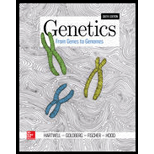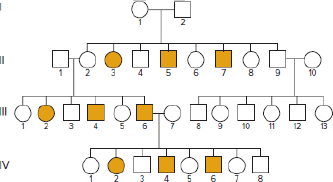
Genetics: From Genes to Genomes
6th Edition
ISBN: 9781259700903
Author: Leland Hartwell Dr., Michael L. Goldberg Professor Dr., Janice Fischer, Leroy Hood Dr.
Publisher: McGraw-Hill Education
expand_more
expand_more
format_list_bulleted
Textbook Question
Chapter 20, Problem 6P
You have decided to study genetic factors associated with colon cancer. An extended family from Morocco in which the disease presents itself in a large percentage of family members at a very early age has come to your attention. (The pedigree is shown in the accompanying diagram.) In this family, individuals either get colon cancer before the age of 16, or they don’t get it at all.

| a. | Based on the information you have been given, what evidence, if any, suggests an inherited contribution to the development of this disease? |
| b. | You decide to take a medical history of all of the 33 people indicated in the pedigree and discover that a very large percentage drink a special coffee on a daily basis, while the others do not. The only ones who don’t drink the coffee are individuals numbered I-1, II 2, II-4, II-9, III-7, III-13, IV-1, and IV-3. Could the drinking of this special coffee possibly play a role in colon cancer? Explain your answer. |
Expert Solution & Answer
Want to see the full answer?
Check out a sample textbook solution
Students have asked these similar questions
A couple has one child with bilateral retinoblastoma. The mother is free from cancer, but the father has unilateral retinoblastoma and he has a brother who has bilateral retinoblastoma. a. If the couple has another child, what is the probability that this next child will have retinoblastoma? b. If the next child has retinoblastoma, is it likely to be bilateral or unilateral? c. Explain why the father’s case of retinoblastoma is unilateral, whereas his son’s and brother’s cases are bilateral.
As a genetic counselor, you are asked to assess the risk for a couple with a family history of familial adenomatous polyposis (FAP) who are thinking about having children. Neither the husband nor the wife has colorectal cancer, but the husband has a sister with FAP. What is the probability that this couple will have a child with FAP? Are there any tests that you could recommend to help in this assessment?
Pancreatic cancer is clearly inherited as an autosomal dominant trait in the family illustrated in Figure 23.1. Yet most cases of pancreatic cancer are sporadic, appearing as isolated cases in families with no obvious inheritance. How can a trait be strongly inherited in one family and not inherited in another?
Chapter 20 Solutions
Genetics: From Genes to Genomes
Ch. 20 - For each of the terms in the left column, choose...Ch. 20 - Characterize the differences between tumor cells...Ch. 20 - Prob. 3PCh. 20 - Prob. 4PCh. 20 - A carcinogenic compound is placed on the skin of...Ch. 20 - You have decided to study genetic factors...Ch. 20 - B cells are specialized blood cells that secrete...Ch. 20 - Molecules outside and inside the cell regulate the...Ch. 20 - Put the following steps in the correct ordered...Ch. 20 - a. Would you expect a cell to continue or to stop...
Ch. 20 - Two different protein complexes called SCF and APC...Ch. 20 - One of the hallmarks of mitotic anaphase is the...Ch. 20 - Concerning the Tools of Genetics Box Analysis of...Ch. 20 - Are genome and karyotype instabilities...Ch. 20 - Prob. 15PCh. 20 - Why dont all loss-of-function mutations that are...Ch. 20 - Chromothripsis is a rare phenomenon, first...Ch. 20 - The chromosome 9/22 translocation associated with...Ch. 20 - A female patient 19 years old, whose symptoms are...Ch. 20 - Prob. 20PCh. 20 - A generic signaling cascade is shown in the...Ch. 20 - Neurofibromatosis type 1 NF1; also known as von...Ch. 20 - Families with germ-line BRCA1 or BRCA2...Ch. 20 - The text explained that retroviruses can cause...Ch. 20 - Hepatocellular carcinoma is the most frequent form...Ch. 20 - Suppose that instead of microarrays, you analyzed...Ch. 20 - Prob. 27PCh. 20 - Glioblastoma multiforme GBM is the most common and...Ch. 20 - a. The legend to Fig. 20.29 identifies which of...Ch. 20 - The website CBioPortal http://www.cbioportal.org...
Knowledge Booster
Learn more about
Need a deep-dive on the concept behind this application? Look no further. Learn more about this topic, biology and related others by exploring similar questions and additional content below.Similar questions
- Familial retinoblastoma, a rare autosomal dominant defect, arose in a large family that had no prior history of the disease. Consider the following pedigree (the darkly colored symbols represent affected individuals): a. Circle the individual(s) in which the mutation most likely occurred. b. Is the person who is the source of the mutation affected by retinoblastoma? Justify your answer. c. Assuming that the mutant allele is fully penetrant, what is the chance that an affected individual will have an affected child?arrow_forwardThe gene controlling ABO blood type and the gene underlying nail-patella syndrome are said to show linkage. What does that mean in terms of their relative locations in the genome? What does it mean in terms of how the two traits are inherited with respect to each other?arrow_forwardThe following pedigree illustrates the inheritance of Nance–Horan syndrome, a rare genetic condition in which affected people have cataracts and abnormally shaped teeth.arrow_forward
- DNA sequencing of your own two β-globin genes (one from each of your two Chromosome 11s) reveals a mutation in one of the genes. given this information alone, should you worry about being a carrier of an inherited disease that could be passed on to your children? What other information would you like to have to assess your risk?arrow_forwardPhenylketonuria (PKU) is a disease that results from a recessive gene.Suppose that two unaffected parents produce a child with PKU. a. What is the probability that a sperm from the father will contain the PKU allele?b. What is the probability that an egg from the mother will contain the PKU allele?c. What is the probability that their next child will have PKU?d. What is the probability that their next child will be heterozygous for the PKU gene?arrow_forwardA couple is planning a family, but since each has a brother having the sickle-cell disorder, they are worried that their kids might develop the disorder too. Neither of them nor their respective parents have the disorder. Which of the following will be your smartest advice as a genetic counsellor? One of four of their children can be expected to have sickle cell. It is possible that none of their kids will have the disorder, but tests should be carried out on both of them to confirm. All of their children will have sickle-cell disorder. There is no chance of any of their kids having sickle cell.arrow_forward
- A. Look at the pedigree, and DISREGARD individual II-8 for the moment. Is the pattern of inheritance of Unetan syndrome dominant or recessive? You may assume that the gene is FULLY-PENETRANT in this family. Please give two specific reasons that support your conclusion. B. Now, looking at BOTH the pedigree AND at the Southern blot, is this trait autosomal, X-linked, or Y-linked? Please give two specific reasons that support your conclusion. Once again, disregard II-8 for the moment. One of your two reasons must refer specifically to evidence present in the Southern blot. C. Define the gene alleles associated with Unetan syndrome. Your alleles MUST be consistent with the pattern of inheritance, AND your genetic notation must be consistent with that used throughout the course. Unetan syndrome allele: ________ Normal allele: ________arrow_forwardWhat characteristics of the pedigree suggest that pancreatic cancer in this family is inherited as an autosomal dominant trait?arrow_forwardWhat characteristics of the pedigree shown in Figure 23.1 suggest thatpancreatic cancer in this family is inherited as an autosomal dominanttrait?arrow_forward
- Albinism is characterized by the lack of a dark pigment called melanin in the hair, skin and eyes. Albinism is caused by the absence of an functioning enzyme called thyrosinase, which is necessary for the synthesis of melanin. Given this bit of information, what can you assume about the heredity pattern of this trait? A) It is caused by a recessive allele of the gene coding for thyrosinase. B) It is caused by a dominant allele of the gene coding for melanin. C) It is caused by a dominant allele of the gene coding for thyrosinase. D) It is caused by a recessive allele of the gene coding for melanin. E) There is not enough information here to tellarrow_forwardVictoria’s youngest child, Beatrice, gave birth to one daughter, one normal son, and two hemophilic sons. **Based on the pedigree, Alfonso XIII of Spain is phenotypically normal. Does that mean he received the normal gene from Beatrice? Why or Why not?**arrow_forwardA young lady requested pre-marital genetic counselling because her sister had died in infancy of gangliosidosis, an autosomal recessive disease. What is the risk that this young lady has similarly affected offspring? What advice should be given?arrow_forward
arrow_back_ios
SEE MORE QUESTIONS
arrow_forward_ios
Recommended textbooks for you
 Human Heredity: Principles and Issues (MindTap Co...BiologyISBN:9781305251052Author:Michael CummingsPublisher:Cengage Learning
Human Heredity: Principles and Issues (MindTap Co...BiologyISBN:9781305251052Author:Michael CummingsPublisher:Cengage Learning

Human Heredity: Principles and Issues (MindTap Co...
Biology
ISBN:9781305251052
Author:Michael Cummings
Publisher:Cengage Learning
What are Mutations and what are the different types of Mutations?; Author: Science ABC;https://www.youtube.com/watch?v=I16YlE8qTBU;License: Standard youtube license